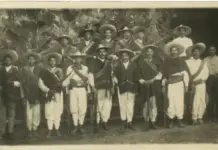In Mexico, when someone visits the United States, it is said that “he went to the other side,” “he crossed the pond,” “he is in the gabacho,” or “he is in Gringolandia.” Why are Americans called gringos in the Aztec country?
The term gringo is recognized by both the Royal Spanish Academy (RAE) and the Dictionary of Mexican Spanish (Dem), and is defined as a colloquial adjective that implies that a person is a foreigner, usually an English speaker.
What does it mean to be a gringo?
The Dictionary of Mexican Spanish (Dem) indicates that gringo is someone “originally from the United States of America, who belongs to this country or is related to it.”
The history of those who named the Gulf of Mexico as such has a close relationship with Tampico and the region José Luis Tapia
The first name it had was Seno Mexicano and those who named it that way had a close relationship with the south of Tamaulipas
Therefore, it can be said that a tourist “comes from Gringolandia” or assume that a Mexican migrant, after having moved his domicile years ago to the northern country, “already feels gringo”.
Another meaning of the word, according to the Dem, is “a blond person who speaks a foreign language”. In this way, the multiverse of gringos can be expanded and include, for example, citizens of the United Kingdom, Canada, Scandinavia, Russia, Sweden, Norway, Iceland and Germany.
In fact, the Dictionary of Mexican Spanish points out that the expression “ojo de gringa” referred to “fifty peso bills, when the ink used on them was blue”.
These notes belonged to the AA family of paper money from the Bank of Mexico, which were in circulation from 1930 to 1992.
The origin of the word gringo: from Greece to war
Although the word “gringo” is widely used in Mexico, its origin is uncertain. Thanks to the BBC of the United Kingdom and the AS newspaper of the United States, we know the following versions:
Luis Fernando Lara, a linguist, points out that the term “gringo” came from the expression: “he is speaking to me in Greek” which implies: “I don’t understand anything he is saying to me”, in reference to the language barrier between Spanish and English. The first is a member of the Romance languages and the second belongs to the Anglic languages.
At a press conference in Mar-a-Lago, Donald Trump announced his desire to change the name of the Gulf of Mexico to the Gulf of America
Another hypothesis dates the origin of the expression “gringo” to the American intervention in Mexico, which took place between 1846 and 1848. At that time, the military uniform of foreign forces was green, which is why Mexicans allegedly shouted “green go home.”
Another explanation holds that Mexicans began calling Americans gringos after hearing the battle cry of captains on the battlefield “Green, go.”
Did the term gringo originate in Spain?
In an unexpected linguistic twist, Esteban Terreros, a Spanish lexicographer from the 18th century, claimed that the expression “gringo” originated in Spain to designate all those people who did not speak Spanish.
This conjecture presumes that the word began to be used in Mexico during the colonial era, from 1521 to 1810.
Republican legislator Marjorie Taylor Greenen seeks to initiate the process before the United States Board of Geographic Names
Despite recent rumors, the term does not have an offensive connotation per se. For example, it is common to hear phrases such as: “the gringo is my friend” or “welcome to Mexico, gringo.”
However, in all fairness, in cases where Mexicans feel underestimated or despised by their American compatriots, the term gringo can be pronounced with the same intention as in the US they say “beaner.”
In conclusion, no one knows for sure where, when or why the word gringo arose, however, that does not prevent it from being frequently used in Mexico.

Source: oem




